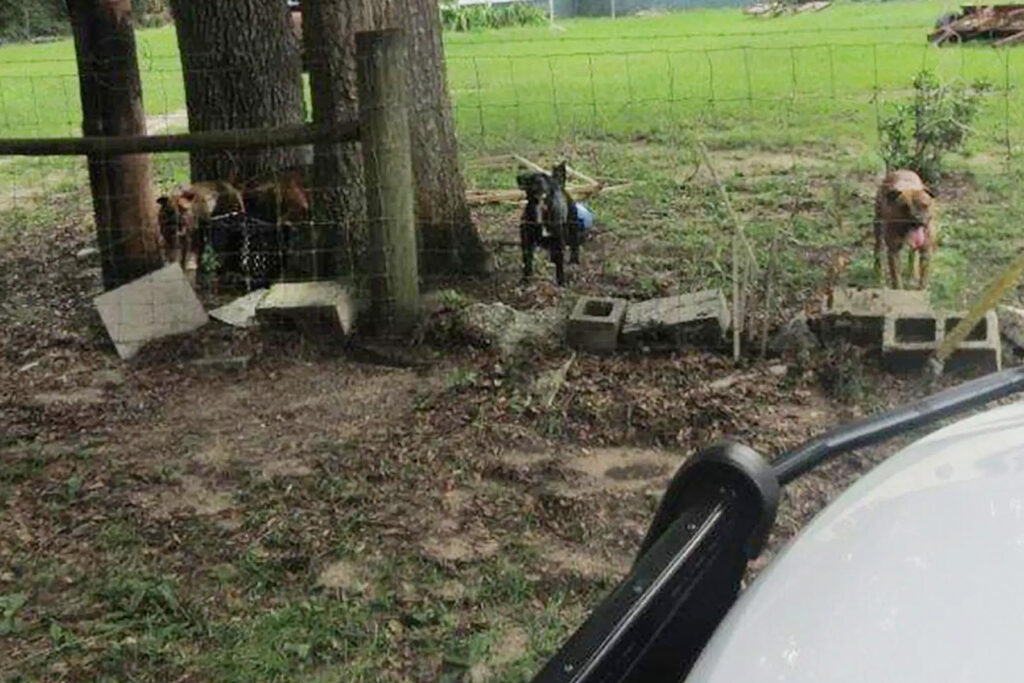Pamela Rock had only been delivering mail for seven months.
The 61-year-old joined the U.S. Postal Service in January 2022, making her rounds along the dirt roads of rural Putnam County.
But on Aug. 21, 2022, what should have been a typical Sunday afternoon of completing her route, Rock’s mail truck broke down while she was servicing Interlachen Lakes Estates. As she awaited help, she was mauled to death by a pack of five pit bulls that had escaped from a neighboring house.
Rock’s death gained nationwide attention, and now, almost three years later, Florida lawmakers have passed the “Dangerous Dogs Bill,” also known as the “Pam Rock Act.”
Introduced in February by Rep. Judson Sapp, the bill aims to strengthen regulations around dangerous dogs in Florida. It was approved unanimously by lawmakers last week and is now headed to Gov. Ron DeSantis’ desk, awaiting his signature.
Tom Rock, Pam Rock’s brother, said the passing of the Pam Rock Act has brought up “a combination of feelings” for him and his family.
“We’re sad that it keeps [happening],” Rock said, “but we’re really hopeful and pleased that after almost three years, we actually see that the legislators of the state of Florida believe us and they’re going to take our suggestion and add the responsibility of holding the dangerous dogs and their owners accountable for the behaviors that they do.”
He and his family didn’t realize how difficult it would be to get a bill introduced and through a vote, but they knew they “just wanted it done.”
Sapp said the bill addresses a rise in dog attacks by defining dangerous dogs, creating a tracking system and ensuring owners are held accountable.

If passed, it would require that any dog who has killed a person, or caused a bite that scores higher than a 5 on the Dunbar Bite Scale – a behavioral scale used to classify the severity of dog bites – be immediately confiscated and impounded while an investigation is conducted.
The act would change current Florida law by requiring strict enforcement and tougher penalties, instead of leaving it up to discretion.
Owners of dogs deemed to be dangerous would also need to obtain a registration certificate from animal control, provided the dog is microchipped, spayed/neutered and the owner carries at least $100,000 in liability insurance. The certificate would require annual renewal, and removal of a dog’s microchip would be considered a third-degree felony.
If signed by DeSantis, the bill would go into effect July 1.
The Dangerous Dogs Act follows a string of dog attacks in the Northeast Florida area in the past year:
- March 2025: A 5-year-old Jacksonville boy was attacked by three family dogs. He sustained serious injuries to his face, head, neck and torso.
- January 2025: Michael Millet, 8, of Volusia County, was mauled to death by a pair of dogs in his neighborhood.
- August 2024: A man and his dog were severely injured after they were attacked by five unleashed dogs in Ponte Vedra Beach.
- May 2024: A Jacksonville woman was attacked by a vicious dog in her neighborhood while out walking her own dog.
- May 2024: Darylyn Warner and Chad Bunfill, a Volusia County couple, were attacked by their newly adopted dog on Mother’s Day, and deputies were forced to shoot the pet.
- January 2024: A Jacksonville man was attacked by three pit bulls in his neighborhood, while walking his own two dogs.
The act is modeled after a Virginia law requiring registration, microchipping and insurance for dangerous dogs.
According to the Centers for Disease Control and Prevention, an estimated 4.5 million people are bitten by dogs each year, with children accounting for at least 70% of all fatal cases.
Paul Studivant, deputy director of St. Johns County Animal Control, said there are already requirements for dog owners that align with the state bill. These include obtaining $100,000 in liability insurance, microchipping, spaying or neutering and keeping dangerous dogs in an enclosure. The agency also maintains its own registration of animals.

According to Studivant, however, the county cannot technically “enforce” these regulations until an incident occurs, such as a dog biting someone. Enforcing them beforehand could be considered discrimination, which would violate a 2023 Florida law barring officials from declaring a dog dangerous based on its breed, size or weight. Therefore, animal control officials must wait until an animal “meets the criteria” of being dangerous, typically after an investigation into an incident or bite.
The Pam Rock Act, if passed, would give local authorities “a little more teeth to pull an animal during an investigation,” he said. If the dog is then determined to be dangerous under the state statute, officials can then enforce those guidelines.
“All these laws are a good thing that are going into place,” Studivant said. “It’s another tool in the tool box and it’s all tools we can use for the better.”
In 2023, the U.S. Postal Service reported 193 dog attacks on its employees in Florida, with Jacksonville ranking third in the state, according to a government report. The state ranked 7th overall among the top 10 states for dog bites.
In a statement on social media following the bill’s passage last week, Sapp called the unanimous approval “a step in the right direction.”
“Pam Rock will not be forgotten,” Sapp wrote, “and I will never stop fighting to keep Florida safe for our families.”

One Response
Excellent reporting, Ms. Hernandez. You have captured all the salient points regarding my sister’s death. Your careful documentation of the other victims in Florida is proof of the continued severity of dangerous dog attacks in the state and the need for stronger laws immediately.
Well Done.
Dick Rock
One of Pam’s brothers